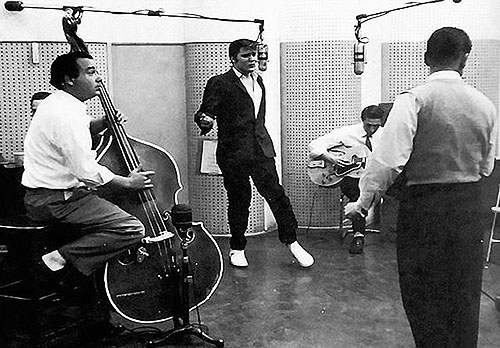
In 1995 the surviving three Beatles recorded “Real Love“, a song that Lennon had written and recorded in 1979. They used his vocal takes on the new recording and sang harmony with him. McCartney played a vintage double bass once owned by Bill Black who played the bass in Elvis’s original mid-1950s trio.
This choice of instrument is what archaeologists call symbolic re-use. It’s when runestones are found built into the walls of later churches. Or when Napoleon’s imperial coronation outfit referenced designs from the tomb of Childeric I. People reach back in time to take part of the essence of great ancestors.
“Real Love” is a pretty decent Beatles song, certainly not one of their weakest outings.
I haven’t heard (let alone seen the video of) that song, but there are plenty of examples in music. For example, the lyrics in the final section of Rush’s “Spirit of Radio” are clearly meant to parallel the corresponding lyrics of Simon and Garfunkel’s “The Sound of Silence” (“The words of the prophets are written….”). Another example: Sting’s “Russians” quotes a theme from Prokofiev’s “Lieutenant Kije Suite”. And there is a tradition in hip-hop of using samples from older songs.
LikeLike
This is about the material object.
LikeLike
Human culture adopts many objects and symbols from the past, as a way of saying “We are the true descendants of this culture / these heroes”, and “we were once this great, and can be again.”
Even the Arthurian Sword in the Stone has been suggested to have been an inherited Roman leader’s sword, used to give Arthur legitimacy. Harking back to past greatness is a technique that has been used in everything from pop music to politics, in good and bad ways. Which is one reason why researching history is so important – it not only teaches us who we really were, but who we are and how we got this way.
LikeLike
As Martin says, this is about a material object. Nevertheless, addressing your point, yes, some stuff is appropriated from other stuff. But there are differences. The Rush song is clearly an illusion combined with a pun (prophets/profits) to the Simon and Garfunkel song. This shows appreciation of the original work. Hip-hop sampling is a different beast entirely: they want something which sounds cool, but they can’t create it themselves, so they sample it, sometimes claiming that they have no obligation to ask and/or pay the creator. Thieves, pure and simple. Then there is the folk tradition, something else again.
LikeLike
Hip hop acts have been “clearing their samples”, that is, making legal agreements about them with rights holders, since the sampler was invented in the early 80s. James Brown made a lot of money that way.
LikeLike